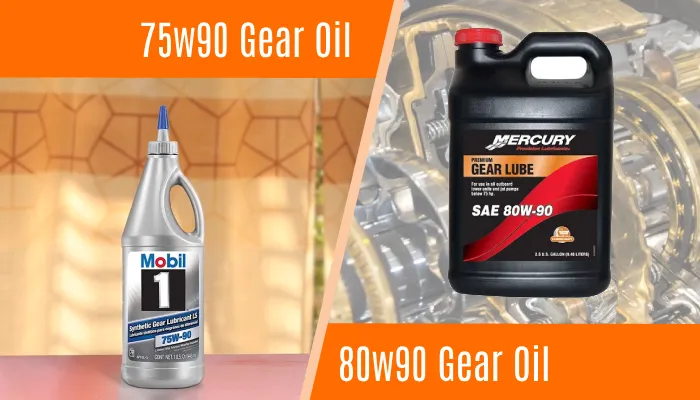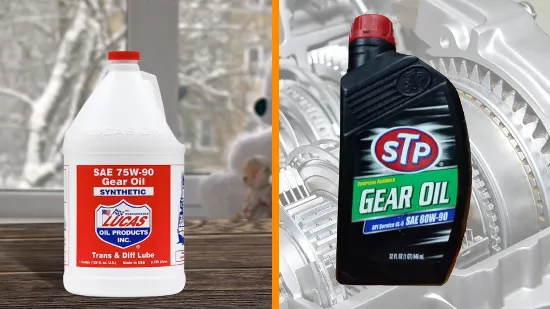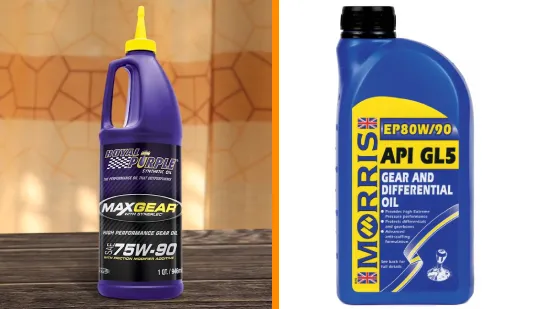Physical Address
304 North Cardinal St.
Dorchester Center, MA 02124
Physical Address
304 North Cardinal St.
Dorchester Center, MA 02124

When caring for your vehicle’s vital transmission components, choosing the right gear oil prevents wear and tear, rust, corrosion, and temperature fluctuations. Two common options are 75w90 and 80w90 gear oils, each with unique properties and applications, although they differ in some ways.
The 75w90 gear oil has a lower low-temperature viscosity rating of 75, making it excel in colder climates. Alternatively, 80w90 gear oil is versatile and performs well in cold and hot temperatures. So, how do you choose the right viscosity for your vehicle?
To help you make a wise choice for your vehicle, we’ll explore the major differences between these two gear oils. So keep reading.

Several key differences become apparent when comparing 75w90 and 80w90 gear oils for automobiles.
To understand the differences in viscosity rating between 75w90 and 80w90 gear oil for automobiles consider their performance in various temperature conditions.
The ‘W’ in the rating stands for ‘winter,’ indicating how well the oil flows at low temperatures. In this case, 75w90 gear oil has a lower viscosity at low temperatures, meaning it flows better in colder conditions than 80w90 gear oil with a rating of 80.
This is important because the oil needs to circulate quickly during cold starts to prevent wear and tear on the engine components.
However, both gear oils have the same high-temperature viscosity rating of 90, ensuring sufficient lubrication and protection when the engine operates at higher temperatures.
Regarding temperature extremes, 75w90 and 80w90 gear oils offer protection, but there are some variations in their performance.
The 75w90 gear oil, with its lower low-temperature viscosity, excels in colder climates. It circulates more easily in cold conditions, ensuring proper lubrication even during freezing weather.
On the other hand, 80w90 gear oil is designed to be versatile and can perform well in both cold and hot temperatures. It offers consistent protection across various climates, making it suitable for various driving conditions.
75w90 gear oil is entirely synthetic, providing superior lubrication and protection under extreme pressure conditions. It is ideal for heavy-duty manual transmissions, limited-slip differentials, and railway gearboxes.
Then again, 80w90 gear oil can be synthetic or conventional. It’s commonly chosen for non-synchronized manual transmissions, limited-slip differentials, and conventional differentials.
The versatility of 80w90 gear oil makes it suitable for a wide range of applications. However, it may not offer the same level of performance as the fully synthetic 75w90 gear oil.
When comparing 75w90 and 80w90 gear oil flow ratings for automobiles, consider the first number in the oil’s viscosity grade.
75w90 gear oil has a lower viscosity at low temperatures, so it flows more easily in extremely cold weather. This ensures the oil can quickly reach and lubricate the components, even in freezing conditions.
In contrast, 80w90 gear oil is slightly thicker at low temperatures, offering better protection for certain applications, such as race cars and off-road driving. However, this higher viscosity may reduce fuel efficiency in normal driving conditions.
Since 75w90 and 80w90 gear oils have different flow ratings, evaluating their impact on fuel economy is important.
The lower viscosity of 75w90 gear oil at cold temperatures allows for faster flow and reduced friction losses. This improved flow can improve fuel economy, making it a more efficient choice for certain vehicles.
Conversely, 80w90 gear oil, although still effective, may not provide the same level of fuel economy benefits due to its slightly higher low-temperature viscosity.
Price is an important consideration when choosing gear oil for your vehicle. 75w90 synthetic oil tends to be more expensive due to its superior flow performance and higher quality. It offers better protection and lubrication, especially in extreme temperatures and heavy loads.
In contrast, 80w90, whether synthetic or conventional, is generally more cost-effective. While it may not provide the same level of winter performance as the synthetic option, it still offers adequate lubrication and protection for most regular driving conditions.
Here’s a comparison table highlighting the key differences between 75w90 and 80w90 gear oils for vehicles:
| Aspect | 75w90 Gear Oil | 80w90 Gear Oil |
| Viscosity Ratings | 75W (Lower cold viscosity) / 90 | 80W (Slightly higher cold viscosity) / 90 |
| Temperature Extremes | Ideal for colder climates, excels in cold weather | Performs well in a broader range of temperatures, both cold and hot |
| Composition | Entirely synthetic, excellent for extreme pressure applications | Can be synthetic or conventional, versatile for various applications |
| Protection and Performance | High-performance, low-temperature fluidity, low pour point, excellent film strength | Reliable gear protection, suitable for high-performance applications |
| Cold-Weather Performance | Flows more easily in extremely cold conditions | Suitable for cold conditions but with slightly higher low-temperature viscosity |
| Fuel Economy | May offer fuel economy benefits due to faster flow and reduced friction losses | May not provide the same fuel economy benefits as 75w90 due to slightly higher low-temperature viscosity |

Regarding gear oil, viscosity is crucial in ensuring proper lubrication and protection for the gears. SAE 75W-90 gear oil offers a distinct advantage over 80W-90 due to its consistency across different temperature ranges.
It maintains a more stable viscosity, thicker under high heat and thinner under cold conditions. This characteristic enables the oil to flow smoothly and provide optimal lubrication even in extreme temperatures.
Also, the consistent thickness of 75W-90 gear oil ensures it fully coats the gears, reducing friction and wear. As a result, it enhances the overall performance and efficiency of the gears, leading to improved durability and longevity.
You can use 75w90 instead of 80w90 gear oil in your differential, as it offers superior viscosity for optimal lubrication and protection of the gears. Despite not being significantly different, 75w90 gear oil has a slightly lower viscosity than 80w90, especially in milder climates.
Since you’re in a relatively mild climate, the lower setting 75w90 is unlikely to noticeably impact your differential’s performance. It’s worth noting that even higher viscosity oils like 150W were commonly used for differentials in the past.
While mixing different gear oils is generally possible, consider compatibility. Mixing gear oils of different viscosities can affect your vehicle’s gears’ overall performance and protection.
In this case, the 75w90 and 80w90 gear oils have slightly different viscosity grades, with the 75w90 being thinner at low temperatures. Mixing these two oils may result in a blend between the two viscosities.
However, note that mixing gear oils can alter their intended properties and may impact the overall performance of the transmission or differential. For this reason, it’s a good idea to consult a professional mechanic.
For optimal performance in your vehicle’s limited-slip differential, consider using 75w90 gear oil. This particular viscosity grade is highly suitable for limited-slip differentials (LSD) due to its synthetic composition and excellent protection capabilities.
The synthetic nature of 75w90 gear oil ensures that it can withstand high temperatures and heavy loads, providing enhanced lubrication and reducing wear on the LSD components.
Also, the consistent thickness of 75W-90 gear oil ensures it fully coats the gears, reducing friction and wear. As a result, it enhances the overall performance and efficiency of the gears, leading to improved durability and longevity.
Choosing the right gear oil for your vehicle is essential to ensure the longevity and performance of its crucial components. When comparing 75w90 and 80w90 gear oil for vehicles, consider the viscosity and compatibility with differentials.
While 75w90 is an excellent choice for extreme conditions and high-performance applications, 80w90 offers versatility and cost-effectiveness. Always follow the manufacturer’s recommendations for optimal performance and maintenance.
After reading this comprehensive article, we hope you will be well-equipped to decide which gear oil is best for your vehicle.
Last update on 2026-02-28 / Affiliate links / Images from Amazon Product Advertising API